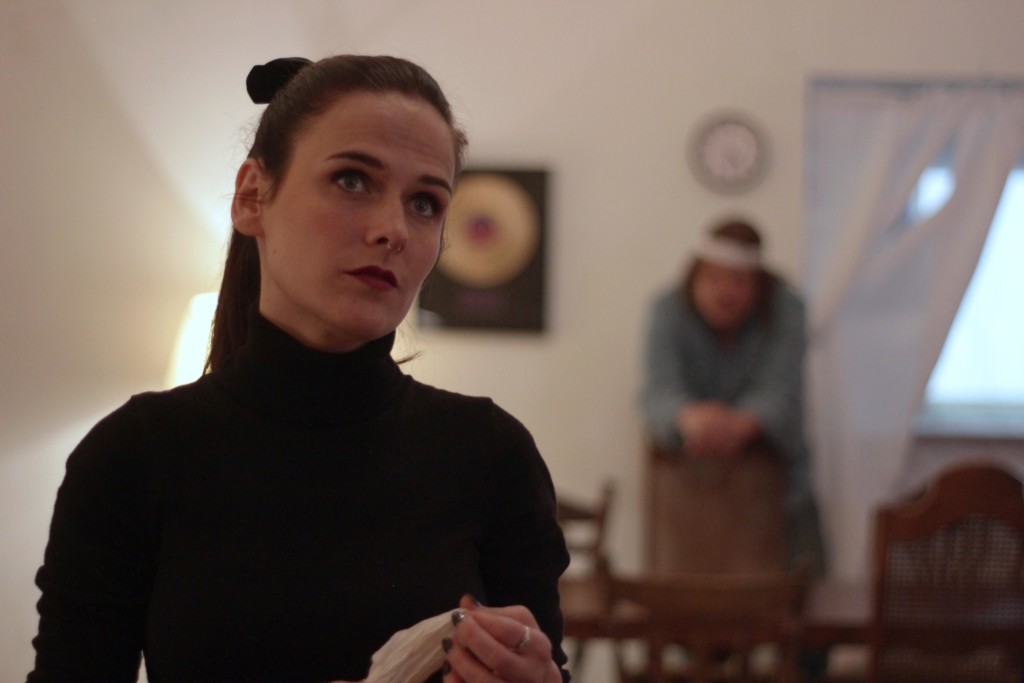Want to know what it really means to take enormous risks in the arts? Exhibit A: The just concluded premiere production of Riot Act’s Mopey Wrecks, a play written and directed by Whit Hertford as adapted from Anton Chekhov’s Three Sisters.
In their original form, Chekhov’s plays can confound a director’s tendencies, which might emphasize excessively either the gloomy shadings or the acutely funny (even stupid or absurd) aspects of the characters and the story elements. Chekhov was known for admonishing repeatedly the actors at the Moscow Arts Theatre. He asked them to dampen the theatrics and focus on realistic portrayals that give every scene rich, layered textures without confusing or losing the audience’s attention.
Hertford’s adaptation, its title as aptly succinct a summary of the original play as one could imagine, is balanced wonderfully and appropriately without becoming overtly theatrical. (The title’s tag completes the summary accurately: A Performative Analysis of Sibling Interdependency and the Increasing Unlikelihood of Returning to Moscow.) The production was staged in a pop-up setting at Ember SLC near downtown Salt Lake City, with assistant director Aidan Croft and set designer Thomas George augmenting the proper appearance and smooth flow of the performance.

With 11 actors, one of the larger casts in recent years for an independent small Salt Lake City theatrical company production, Mopey Wrecks could have degraded easily into gratuitous vaudevillian clichés. But, the ensemble took heart and professional mind to the disciplined rehearsal philosophy that would be required to pull off successfully any Chekhov original. Thus, the audience sees the stage characters epitomizing the Chekhovian-Hertfordian self-absorbed frustrations as lifelike and veritable. They appear so genuine because we, too, naturally are obsessed with how our own legacies and decisions will be viewed in hindsight, even if we recognize that perhaps we could have been more self-aware in the moment of their occurrence.
At the surface, Hertford sustains the broad outlines of Chekhov’s original. Everyone has gathered in the Prozorov household but instead of a country estate many miles from Moscow it is based in an upstate American town somewhere along the East Coast. In Hertford’s version, the deceased patriarch is a successful musician who wrote, performed and recorded his songs. The family moved into the home after his wife died. The play opens on the first anniversary of his death from the same cause (a brain aneurysm) of his wife’s passing. On the dining room table rests the urn containing the father’s ashes. The home is now a sanctuary of sorts for traveling musicians and his children with their own unfulfilled lives.
There are the three sisters: Olga (Ellesse Hargreaves), a teacher who never married or had children, Masha (Nicki Nixon), who is married but wants to resurrect her dormant career as a poet, and Irina (McKenzie Steele-Foster), the most idealistic of the sisters who hopes to return to her childhood home of the city.
Hertford translates and transfers expertly the sibling dynamics to the adaptation but also with a heightened sense of avoiding conventional interpretations. Thus, the actors illuminate their roles with such authentic emotion that one believes the trio actually could be related to each other. As the eldest sister, Olga persistently urges Irina, the youngest, to avoid the mistakes she has made. Meanwhile, Irina, who has her own earnest ambitions, must contend with less-than-desirable suitors who profess their love for her. Meanwhile, Masha is aloof, despondent and dejected in her anger. She has her own creative aspirations but is fed up by her marriage to Kulygin (played with just the right Howdy Doody inflection by Roger Dunbar), who has the same good-hearted, happy-go-lucky nature of the Chekhov original but instead of a teacher he is now, ironically, a therapist.

Nixon is marvelous in tracing Masha’s emotional trek from her near-total annoyance and despondence about everything around her at the play’s beginning to the brief moments of lightness, as she is entranced by the philosophical optimism of Vershinin (played by Jesse Ryan Hayward with the proper well-articulated intelligence), a guitarist in the band, and then to the strikingly realistic heartbreak at the end, one of the play’s most spell-binding moments.
Joining Vershinin from the band are Baron Tuzenbach, the least talented guitarist in the same band (well handled by Andy Rindlisbach); Saul Solyony, the roadie (played by Hertford and the character follows the strange junior captain of the garrisoned brigade from the original) and Roland ‘Doc’ Chebutykin, the frequently inebriated band manager and the sisters’ surrogate uncle (played generously by Darryl Stamp).
Hertford shapes Andre, the brother, again with the right dose of fidelity to the original. And actor Aaron Kramer makes Andre thoroughly believable as a hopeless, careless, irresponsible romantic who has the smarts and wits to make a promising life as a professor but he falls victim to his addictions and I inadequacies. And, there is his love and eventual wife, Natasha (played smartly by Brighton Hertford), who goes from a naively sweet guest, distrusted and disliked uniformly by the three sisters, to an overbearing parvenu who takes over the household by managing to do so just under nearly everyone’s radar. Hertford’s version takes due diligence in showing precisely how the sisters’ utter abhorrence for their sister-in-law led Natasha to retaliating monstrously to the insensitivities she has suffered. Brighton Hertford’s transformation as Natasha captures this perfectly.
Rounding out a more than amply talented ensemble is Anne Cullimore Decker as Anfisa, the elderly housekeeper to whom Olga, in particular, and others refer to as Grammie. Natasha is ready to toss out the old woman, convinced she has outlived her usefulness. The play opens with music (Sagittarius’ Sweet Marie) and then Decker as Anfisa opens with the brief monologue setting the contours of the action, followed by a brief musical excerpt — The Kinks’ Picture Book. These musical excerpts occur occasionally throughout the play, as notable markers of foreshadowing and emotional impact.

In the large ensemble, Anfisa is a relatively minor character and she often is associated with some of the play’s most humorous moments. However, Anfisa’s significance cannot be overstated. Her presence is the strongest reminder of what once was the complete sense and control of the family’s household, which is why Natasha pursues so aggressively the opportunity to remove her from the scene. In fact, without stating it specifically, Anfisa seems to be the only person who can stand up with any true will to Natasha, unlike the three sisters who are mired in their own powerlessness. Decker plays this role with supreme nuance.
It is exactly the sisters’ inability to respond or reject Natasha’s plans that make it plain to audiences why Hertford’s contemporary adaptation of Chekhov works better than many postmodern interpretations that play up the same themes but with more bizarre elements than what the original author certainly would have conceived. In pre-revolutionary Russia, Chekhov’s plays stood out for showing just how people – even family members and longtime friends – listen so little to each other. In Hertford’s version, we hear the contemporary frustrations of people talking at each other, believing erroneously their eloquence empowers them but only leaves them hopelessly impotent to change what is happening. This is the paralyzing side effect of our immersion in social media chats and channels.
True, there are many points in Hertford’s script that elicit justifiably the laughs, even when the seemingly articulate words end up sounding absurd. But, there also are moments where one fails to find words to express the emotions being invoked in the play’s truly eloquent instances. One example is Masha’s breakdown into deep sobbing, as she stands by a record player and listens to one of her father’s songs. The emotional pain loosened from its inner grip strangely enough is emancipating. Prior to the play’s opening, Hertford wrote a post about his adaptation:
In most translations and productions the fourth act is presented with a message of resolved heartbreak. This continued to confuse me, because when digging through original sources, I found nothing that outlined such an interpretation. What I did find instead was a reverse-engineered piece of fierce, focused feminist theatre. But it had been awhile since the dust had been blown off. So, I took liberties in wildly adapting (or rather ambushing) the decades of performances to breathe new life into the fates of Olga, Masha, Irina and even their mostly forgotten brother, Andre. Not letting them merely sit in their agony, but to transform. A return to the likely original intended ending, an exhausting, cruel and beautiful celebration of time, evolution. Shattering the museum glass.
Indeed, Riot Act’s adaptation of Mopey Wrecks can be writ large as the ubiquitous tensions of restricting provincialism trying to prevent liberating cosmopolitanism from taking over. These unreconciled tensions bedevil and transfix us individually and collectively as well as contribute to our shortcomings in communicating productively and respectfully. The ensemble’s successful performances underscored the importance of cross-fertilization, as actors from varying creative backgrounds converged to find unity in a specific practice of theater, which refreshes and revitalizes interpretations of classics and adaptations that introduce previously submerged revelations. In a year of many adventurous works of creative expression that are expanding our visions and ideals about a Utah Enlightenment, this premiere production of Mopey Wrecks is unquestionably among the top handful of outstanding works, which illuminate a daring creative path that should be taken up with greater frequency.

